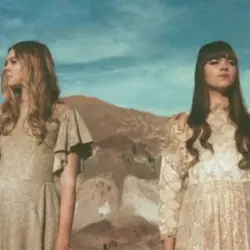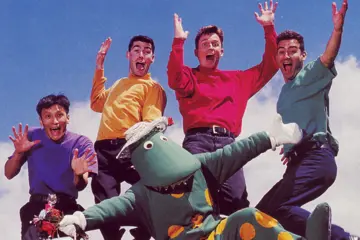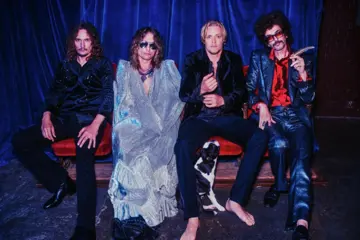 First Aid Kit
First Aid KitCalling in from the darkness of a snowy Stockholm winter, Klara Söderberg's sweet voice, accented in American with little to give away her Swedish heritage, becomes animated as she recalls First Aid Kit's only tour to Australia ahead of their return this month.
“I think the first album we were just so sort of surprised that, I mean just travelling so far away and realising that people were listening to our music in Australia, first of all that was just a big thing for us,” the singer and guitarist says. “We loved the people, we loved the food, we loved the places we played – it was such a special tour and we loved it, so we can't wait to come back.”
The younger Söderberg sibling who has made a name alongside 21-year-old sister Johanna for beautifully doleful folk-country harmonies runs through the standard tourist checklist of koala bears and kangaroos to cover during their visit. Though it's tempting to counter back with ABBA, Ace Of Base and Roxette as typically Swedish ambassadors, the style of First Aid Kit couldn't be further removed from that of Sweden's pop heroes.
“I started listening to folk and country music when I was about 12-years-old, and it started with the band Bright Eyes and then I found Bob Dylan, and Townes Van Zandt and Leonard Cohen and other musicians like that, and it just inspired me to pick up a guitar and start playing. I just started writing songs, and Johanna started singing harmonies with me and that's sort of how it started; we never really thought about it, it was just what we wanted to do.”
Don't miss a beat with our FREE daily newsletter
Though she's only now 19, Söderberg and her sister were handpicked by Karin Dreijer Andersson of The Knife to release their debut EP Drunken Trees through Rabid Records back in 2008. The earliest taste of First Aid Kit was EP track Tangerine, a convincing portrayal of a broken, world-weary wife, from a girl who was barely a teen.
“That was the second song I ever wrote – I was 14. Yeah, I don't know,” Söderberg says as she ponders where the topic came from. “Writing music is a such a... like we really try to keep it a very in the moment thing, a very impulsive thing and just writing when we feel inspired, and sometimes the inspiration just comes and you don't know where it comes from – you start writing and these subjects pop into your head and you wanna write about it… I think I just imagined myself being this woman, being in this situation, having a husband who was cheating on me and how someone could react to that, and just writing about it. I don't know exactly why – to me now it seems a little funny that I was so young and that was what I writing about, but to me it was completely serious. I still really like the song and I still feel like the lyrics are, you know they're simple but they can be very true to people and very honest.”
On The Lion's Roar, the self-confessed romantic paid homage to the relationships of two sets of country legends on Emmylou.
“The song is a tribute to Emmylou Harris, and Gram Parsons, and Johnny Cash and June Carter – these people that sang harmonies so beautifully together. Obviously June and Johnny they were married, and Emmylou and Gram, they never were an official couple but there are rumours that they were in love, and I feel like listening to their music, it's hard to imagine that they weren't in love when you listen to them singing together. The song is about the special bond that you get when you sing with someone, the connection you get – it's something so very intimate. Emmylou and Gram, they couldn't be together, but they still could sing together and it's sort of saying that if we can't be together at least sing with me. The video we shot in Joshua Tree because Gram Parsons, it was his favourite place on earth and he sadly died there in '73 so it just felt really special going back there and creating this video there. It's such a magical place – we've always wanted to make something in the desert and it was just so perfect to make the video there for that song,” she enthuses.
Emmylou is a way of referencing the close sibling relationship too, though another family member also plays a significant role within the First Aid Kit team.
“When I started writing songs and I wanted to record demos, our dad because he had been playing [in '80s new wave outfit Lolita Pop], he had recording equipment at home so I could record my first demos, and then we just played around and Dad was like, 'Oh can I play some bass on this song or play some keyboard or something?', and I was like, 'Yeah, of course!' And then Johanna's like, 'Oh maybe I should add a harmony to this', and that was sort of how Johanna and I started singing harmonies. Our dad has always sort of been there and helped us with the songs, not in the song writing but like arrangement wise, and so for the first two records he produced the records with us and now that we went to Omaha, he was there and played the bass, was there in the studio and just helped us out. He's very important to us, and he's with us on tour – he does the sound on our shows,” she adds.
Taking the next step on the production of The Lion's Roar, the family travelled to Nebraska to work with revered producer and member of Bright Eyes and Monsters Of Folk Mike Mogis. Considering the influence of Bright Eyes on Söderberg, surely every day of recording was a pinch me experience?
“Honestly? No – because we had to sort of see him as different, you know we couldn't come into the studio everyday and be like: 'Oh my god, there's Mike Mogis again!'” she says through giggles. “We just had to look at him like he was anyone, or just like our friend Mike, and not like Mike 'The Big Producer' Mogis. And I feel like it was very easy with both Mike and [Bright Eyes front man] Conor [Oberst] because they are such humble people, and they were so welcoming – it wasn't hard…
“We knew that it was gonna be a good record – we felt really happy with it when we had written the songs, but then coming into the studio, Mike really helped us make it even better than we thought it would be, honestly. I mean he just made it more dynamic, and gave it more depth I think. We're really, really happy with it.”















